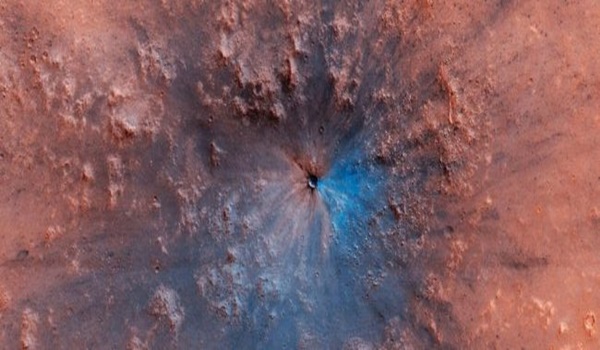Researchers claim that they have found multiple underground water reservoirs on Mars, which might indicate the existence of liquid water on the planet
Scientists have always been particularly interested in the Red Planet, mostly because of its similarity to the early Earth. Even though it may seem barren these days, it looked much different in the past, due to the warmer climate.
Experts cannot be sure that life existed on this planet, ever, but many of them maintain that it was habitable. There are even theories that there are still remnants of that life hidden beneath the surface of Mars.
Now, a new study which was published by the journal Nature Astronomy claims that there is a subterranean reservoir of extremely salty water near the Martian south pole.
Keeping in mind that liquid water is essential for survival, the existence of such a lake to scientists is a sign that this planet could harbor its own native microscopic life.
Even though some researchers still don’t believe that water exists on Mars, the new study simply confirms the findings from the 2018 study, which found evidence of a colossal underground reservoir of liquid water at the Martian south pole.
The discovery was made using the Mars Advanced Radar for Subsurface and Ionosphere Sounding (MARSIS) instrument on the Mars Express orbiter.
Researchers then informed of an underground “lake” of liquid water beneath layers of sediment near to Mars’ south pole, similar to the subglacial lakes that can be found underneath Greenland and Antarctica’s ice sheets on our planet.
The study from 2018 was considered a huge breakthrough in the search of alien life in the universe and on Mars, but skeptics kept questioning whether scientists can be absolutely certain of their findings.
Therefore, scientists took a step forward, and discovered a network of multiple lakes under the southern polar ice cap!
This latest study used the methods used by the satellites orbiting the Earth to study the massive subterranean lakes underneath Antarctic glaciers to confirm that the vast store of liquid really exist on the Red Planet, and spans about 15 miles across.
Planetary scientist Roberto Orosei of the National Institute for Astrophysics in Italy, and principal investigator for MARSIS, reveals:
“These lakes have probably existed for much of Mars’ history. For this reason, they could still retain traces of any life forms that could have evolved when Mars had a dense atmosphere, a milder climate and the presence of liquid water on the surface, similar to the early Earth.”
The Earth’s subglacial lakes are blooming with bacterial life, so scientists are excited to believe that it has a possibility that the same thing can happen on Mars.
Elena Pettinelli, a geophysics professor at Italy’s Roma Tre University, who led the research on this and the previous study, explained:
“We are much more confident now. We did many more observations, and we processed the data completely differently.
The existence of a single subglacial lake could be attributed to ad-hoc conditions such as the presence of a volcano under the ice sheet, or some other situation unique to the specific location where we found the first subglacial lake.
The discovery of an entire system of lakes instead, suggests their formation process to be relatively simple and possibly common.”
Researchers used this technique to determine the location of a patchwork of other buried reservoirs in the area.
While they are still not certain of the depth of the reservoirs, they have been detected slightly more than a mile below the surface.
According to the data, the bodies are probably filled with hypersaline solutions or water that is so saturated with a thick concentrate of calcium, magnesium, sodium, and potassium, that it remains in a liquid form despite the extremely cold temperatures on the south pole of Mars.
If these pools are filled with liquid water, they are a possible home to microbial alien life, which could be a remnant of life that had existed billions of years in the past there, in case Mars had the same amount of oceanic expanses of water on its surface as our planet does.
In case these findings are confirmed, this will be the first time that liquid water has been discovered on Mars.


